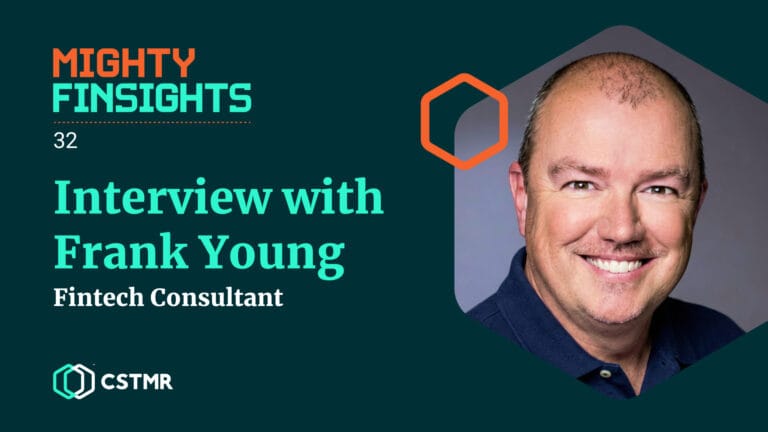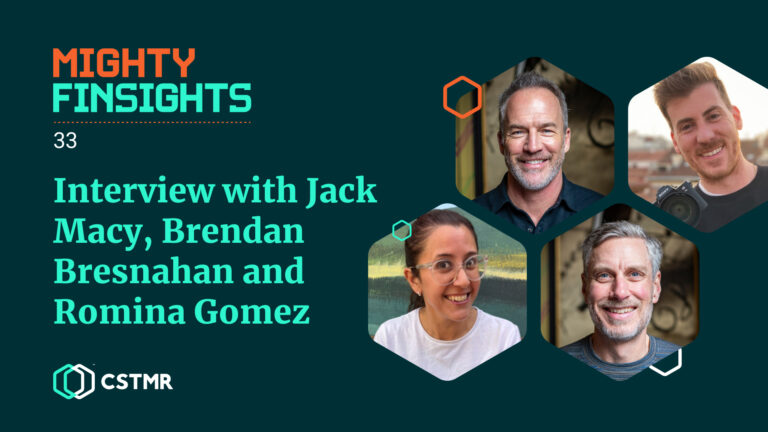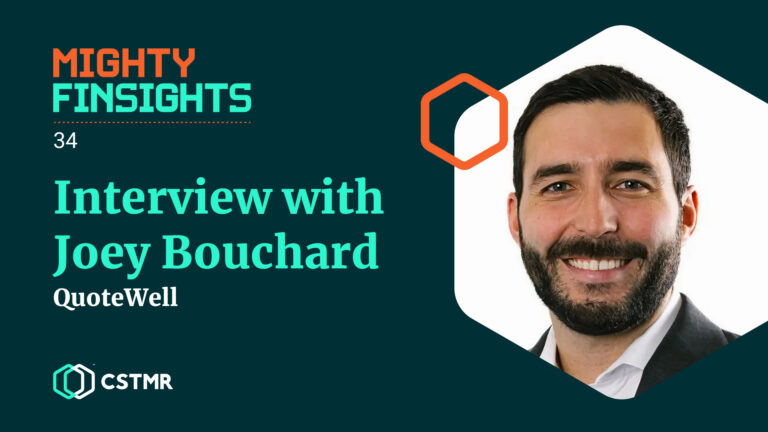In this episode
In this chat, Meghan Kober, VP of Fintech Partnerships & Investments at U.S. Bank, starts by telling us about how she got started in fintech. She then discusses her role on the bank innovation team and how they work with startups to accelerate innovation in the banking industry. She talks about the challenges of introducing new ideas to business lines, and the importance of cultural fit in partnerships. Meghan also highlights the trend of B2B software in fintech and the benefits it brings to both large organizations and startups. She encourages individuals interested in fintech to jump in and start somewhere, reflecting on what brings them high vibe and low vibe experiences.
Key takeaways
- U.S. Bank’s innovation team works with startups to accelerate innovation in the banking industry.
- Introducing new ideas to business lines can be challenging.
- Cultural fit is important in partnerships between large organizations and startups.
- The trend of B2B software in fintech is exciting and beneficial for both parties.
- Individuals interested in fintech should jump in and start somewhere, reflecting on what brings them high vibe and low vibe experiences.
Transcript
Rory Holland
Meghan Kober from U.S. Bank, so good to have you here.
Meghan Kober
So great to be here.
Rory Holland
Welcome to Austin.
Meghan Kober
Thank you.
Rory Holland
And SX.
Meghan Kober
I love Austin. First time at SX.
Rory Holland
Really?
Meghan Kober
Yeah.
Rory Holland
OK. What do you think so far?
Meghan Kober
Fantastic. Yeah, I love Austin, and now with all the tech and music and film and culture, it’s amazing.
Rory Holland
Yeah. And you grew up in Minneapolis. Where’d you go to school?
Meghan Kober
I went to Maple Grove.
Rory Holland
Maple. OK.
Meghan Kober
Yeah, and Hamlin University in Saint Paul.
Rory Holland
Who is Hamlin’s mascot?
Meghan Kober
Piper.
Rory Holland
Piper?
Meghan Kober
Yes.
Rory Holland
Is Piper a person?
Meghan Kober
Yeah, it’s a story of a person who blows a flute.
Rory Holland
Oh, right. The Piper. Like leading people?
Meghan Kober
Yeah.
Rory Holland
Interesting. I don’t think I’ve ever seen your mascot on any NCAA or ESPN things.
Meghan Kober
No, we’re not on ESPN. It’s a small, small school.
Rory Holland
Is it in Minneapolis?
Meghan Kober
It’s in Saint Paul.
Rory Holland
In Saint Paul, you said that. OK. So you’re pretty much born and raised. That is so cool. Second person I’ve talked to and, of course, I know Jason with Alloy Labs is in Minneapolis these days. We have some clients in Minneapolis, so I love that town.
Meghan Kober
I love Minneapolis. It actually reminds me a lot of Austin, actually, with the river and great food, great music, but the weather is definitely better here in Austin.
Rory Holland
Yeah, this time of year.
Meghan Kober
Yes, this time of year.
Rory Holland
I grew up in Detroit, so I’m grateful for today.
Meghan Kober
Yeah, me too.
Rory Holland
For those that are listening, today is going to be 60, sunny, beautiful.
Meghan Kober
Beautiful, yes.
Rory Holland
Nice! How did you get started in Fintech?
Meghan Kober
Oh gosh, well, I went to school for accounting and marketing with the intention of being a CPA and took those exams and decided that the CPA route was not what I wanted to do. So, it was obvious that I should try out my marketing degree. And went to an advertising agency and learned a lot about healthcare, actually, I worked with Optum and UnitedHealthcare digital media and how to brand and market and get their word out. And then decided that that wasn’t for me either. So my sweet spot right in the middle was finance. So I went to Ameriprise where I was in money movement and we were building our own money movement capabilities internally. That’s where I really learned more about technology and innovation and building products. I actually built a kind of a Domino’s Pizza tracker of operational metrics in the back office.
Rory Holland
Cool, I didn’t know there was such a thing. That’s cool.
Meghan Kober
Yeah. So there’s a bunch of systems and they obviously don’t all talk to each other and so I connected all the data on the backend so that you could see where each of those requests were at any given time and make process improvements to speed things up and give transparency into what’s going on.
Rory Holland
That is so cool. Did that carry you into your work at U.S. Bank?
Meghan Kober
Yes. And that’s what got me passionate about technology and innovation and just the power of technology. So, I got more involved in the community and with events in Minneapolis, and that’s actually how I met David Ness, my current manager, through Twin Cities Startup Week and some other communities in Minneapolis. Ever since I met David, I have just been pinching myself that this is my dream career. I’m very grateful to be able to be doing this, especially in Minneapolis, because when I say fintech, a lot of people don’t know what I’m saying in a small Midwestern town. So, it’s a great time.
Rory Holland
Oh, that’s cool.
Meghan Kober
Yeah.
Rory Holland
So tell us a little bit about what you do. And then I have a following question for you.
Meghan Kober
Yeah, absolutely. So I work at U.S. Bank’s Innovation Team and work across many different business lines to understand their needs, pain points, priorities, and roadmaps. And then I go into our large ecosystem of venture capital firms, corporate accelerators and startups and I pair us together. And so I help out entrepreneurs to get their products to market and we accelerate innovation at U.S. Bank.
Rory Holland
So fun. So when I talked with David yesterday, one stat that I thought was pretty amazing… I think he had said 363 partners, maybe active partners, I’m not sure, but I can only imagine. So you’re a consultant in the sense that you’re identifying a need?
Meghan Kober
Yes.
Rory Holland
And then you’re a business developer because you’ve got to have your pipeline and you’ve got to have your network.
Meghan Kober
Yes.
Rory Holland
And then you’re a matchmaker.
Meghan Kober
Yes.
Rory Holland
Yeah. What a cool job.
Meghan Kober
Yeah. It’s amazing. It was a big learning curve. Because there’s a lot of things, I wear a lot of hats. But it’s really incredible to be able to work on so many different things and each day is a new opportunity to learn something, which is really cool.
Rory Holland
So I was going to ask you, how would you describe … what you love most about it?
Meghan Kober
Oh, well, I really love the flywheel effect of being in a large organization and being an entrepreneur. So, understanding the needs and pain points of our business lines who are typically putting out the fires of the daily basis and don’t necessarily always have the ability to think or space to think five, ten years out in the future, or even work with or understand who is out in the market and what are some innovative products out there. And so I think that is one of the things that I really, really like about my job is that being in a large organization and then helping entrepreneurs and startups, because when we innovate our products we meet the needs of our customers. And then ultimately we’re helping those startups build and create jobs and give back to their communities as well.
Rory Holland
Are the startups, I’m sure it’s global.
Meghan Kober
Yes.
Rory Holland
Do you have particular communities you like to work in or is it just global you find fintech potential partners?
Meghan Kober
Yeah. So because we’re U.S. Bank, we’re primarily based in the United States. So, a lot of fintechs that we work with are based in the United States. And then we do have some partners that we work with over in Europe actually because especially in London with the open banking and open data they’re a little bit more advanced in that area and so we can see the trends that are happening over there and bring them over to the United States. So that’s really fun. But yeah, most of our sweet spots of startups that we work with is about a Series B because typically they have a good product market fit and have some clients that they’ve been through third party risk management already and it seems to be a good partnership that way.
Rory Holland
So I assume though you’re getting introduced at early stage, and in some case, really early.
Meghan Kober
Yes.
Rory Holland
Maybe Seed. But once they get into an A and a B, you’re saying that they’re a little bit more proven and they’ve gone through all of those compliance checks.
Meghan Kober
Yeah, absolutely. And so our team is introduced to them at seed, which is a little bit early to introduce them to the business lines, but we keep in touch with them and see how their product develops and pivots and provide mentorship and advice kind of based on where they’re going. And then once they’re in that sweet spot, then we make the intros to our business line.
Rory Holland
I really like your and David’s job.
Meghan Kober
It’s fantastic. Yeah, we like to say we have the best jobs in the bank.
Rory Holland
Yeah, well he did say that I think. Something like that. Given that, it sounds wonderful, but what are some of the challenges you are facing?
Meghan Kober
Yeah, absolutely. I think I mentioned earlier, the business lines are really focused on today and so sometimes you’ll come to them with a solution or a company and they’ll be like, “What? Where are you coming from with this idea because this seems really, really wild and out.” And so just taking a step-by-step approach of what’s the next step? What’s the next step? Because a lot of times in innovation, it’s really blurry, and so you don’t actually know where the end the end, you know where the end goal is, but you might not know the path to get there and so just at least learning and evaluating each step that you go through is probably the best way to overcome those challenges.
Rory Holland
Yeah, I could imagine it’s complex and then working in a major bank.
Meghan Kober
Yes.
Rory Holland
We talked a lot about how banks have to do it right all the time, there’s no room for error.
Meghan Kober
Yes.
Rory Holland
But yet in your side of the business, you’re constantly evaluating new opportunities that are maybe yet somewhat unproven.
Meghan Kober
Yes.
Rory Holland
I’ve got to imagine that’s a challenge too.
Meghan Kober
Yeah, absolutely. I think one of the biggest things being in innovation is understanding frameworks, really thinking of being a scientist actually, what’s my hypothesis in this situation? And what is the easiest way to test this and see if it’s gonna move forward into the next step? And so we take innovation very risk-based. So, what’s our risk-based hypothesis and how do we test that? That’s typically done through proof of concepts or proof of value, especially with early stage companies too, just like making sure that, you know, the technology that they say and what they do and the claims that they have, it is aligned to what we’re looking to do. And then we move forward into more commercial terms after we have kind of tested all the hypotheses out. And in terms of partnerships, the most interesting part isn’t necessarily the strategic fit or the technology, because that’s really easy to prove out, a lot of times where the rubber meets the road is that cultural fit. And so just making sure that the company that we’re working with is collaborative and that their values are aligned to our values and that there’s good alignment there.
Rory Holland
Yeah, and it’s got to make sure it really aligns well. Is there anything you’d like to share that maybe people don’t know about U.S. Bank? That you’d like them to know?
Meghan Kober
Oh. Well, I would just say that U.S. Bank is really doing some really cool things in the community around ecosystem building and creating entrepreneurship. I have the pleasure of working with business banking, and I not only work with startups for the fintech to accelerate our capabilities, but I really appreciate what these entrepreneurs are doing and how we can support them from a business banking standpoint, but also innovation of education and working with accelerators and getting them connected to venture capital because where there might not be an opportunity that U.S. Bank can support, where we can leverage our network and our opportunities is something that we like to give back to the community.
Rory Holland
Yeah, that’s great. I love that you’re working with early stage companies. It’s something at CSTMR that we do a lot. We love working with good, vision-oriented companies that are looking to make a positive impact through the products and services they’re offering. And it’s often really hard, as you know, in talking with these early stage folks to be successful to get through the seed to an A and then even into a B, it’s tough.
Meghan Kober
It is very tough.
Rory Holland
It’s really hard and so you guys are going through, and I love the process by which you guys test, we do a lot of hypothesis testing in digital and we’re able to do that really quickly and it’s fun. Is there a particular direction you see fintech going, when you think about some of the leading indicators for what you probably see every day at U.S. Bank. I know we can’t predict the future, but curious, where do you see it going from here?
Meghan Kober
Yeah. Well, I’m really excited about this trend of B2B software. We’ve obviously been in it for a long time, but I’m seeing the shift of B2B and I just think that it’s a magical shift and something I’m really excited about. Because not only do we, with B2B, like partnership with a large organization, it helps drive innovation. I mean, as you can imagine, U.S. Bank, it takes a long time to develop products and get those to market internally. And so being able to test and learn very quickly with startups is something that we really like to do. And then it also helps the startups because they are not having to go out and acquire customers through large advertising budgets and they’re able to focus on the product and get it out to scale so that they can test and learn and tweak even better. And so I’m really excited about this flywheel effect that’s going into motion right now.
Rory Holland
Yeah, that’s cool. You’re probably helping launch and establish some of these earlier stage fintechs just through the work they’re doing with you guys.
Meghan Kober
Yeah, absolutely, and that’s also very … it’s kind of a double edged sword in a way of when you start working with fintechs, obviously the financial market is very small and word gets out very quickly, and so it’s great that we’re able to accelerate startups that we partner with and are super passionate about as a leading indicator to the market that they’re a good fit. But then, if you’re a first mover, obviously, and something is out of your control, that’s also something that we have to be aware of.
Rory Holland
Sure. It’s wonderful,you have such a cool background. What advice might you give somebody that is thinking about entering the fintech space or wants to get started in financial services?
Meghan Kober
Yeah. Well, I would just say just jump in and get started. Like, I love podcasts. One of my favorite podcasts is the Tim Ferriss podcast. I also loved Jason’s Breaking Bank, I think that’s really, really cool as well. But I think in terms of getting started, just start somewhere and make a, I call it a high vibe and a low vibe list … on a weekly basis I reflect on what was really high vibe this week, what did I like to do that set me on fire that I just got so in the zone and what was low vibe? And sometimes you can’t necessarily eliminate all of the low vibe things, but at least think about, next time this happens, how can you create some boundaries or different areas to overcome those and then just test and learn and just keep evolving just like products. You can design your own life.
Rory Holland
That’s so cool. Thanks for sharing.
Meghan Kober
Yeah, absolutely.
Rory Holland
Super fun chatting with you. Thank you, Megan, U.S. Bank.
Meghan Kober
Thank you so much. It’s great to be here.
Rory Holland
Thank you.
Meghan Kober
Thank you.
Rory Holland
Have fun.
Meghan Kober
Thanks.


